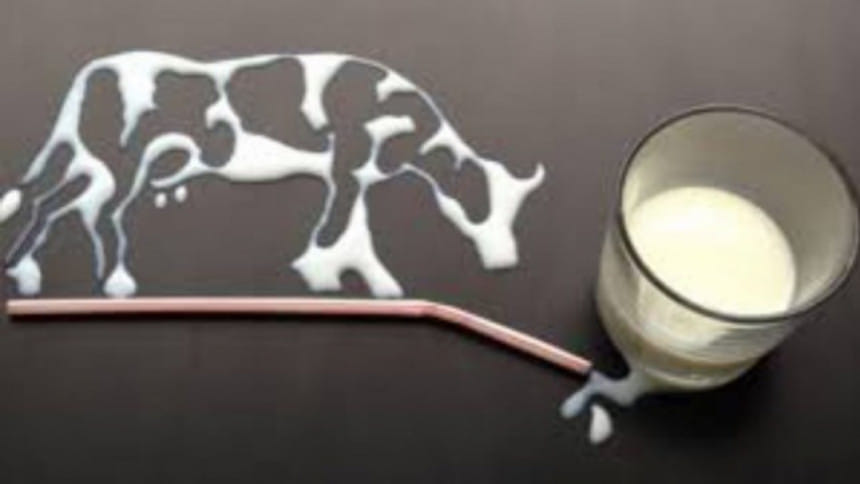Unsafe Packaged Milk: Mothers’ new malady

Sharmin Afroz, a housewife, does not know what to do.
Her two school-going children, aged seven and eleven, would only take porridge with milk for their breakfast. But Sharmin, 39, is not sure if she should allow her children to take pasteurised milk anymore.
Her concerns deepened after the High Court banned production and consumption of pasteurised milk of 14 brands, on grounds that they contain harmful substances such as lead and antibiotics.
Although the Supreme Court subsequently stayed the HC order and a new government-sponsored lab test done in India found that milk of seven of these brands was safe for consumption, Sharmin still hesitates to take any risk.
“I do not know which report to believe and which order to follow,” she said, referring to the varied test results and contrasting court orders.
The High Court considered three of the four reports placed before it while imposing a five-week ban on July 28.
The three reports were prepared by the Bangladesh Council of Scientific and Industrial Research (BCSIR), Institute of Public Health (IPH) and Bangladesh Atomic Energy Commission (BAEC) -- all government-funded agencies.
The court did not consider the icddr,b report as it does not have the capacity to detect heavy metal and antibiotics in milk.
The tests found that all the milk samples contain lead beyond permissible limit although the presence of antibiotics was within the safe zone.
“The three reports placed before the court by Bangladesh Food Safety Authority alerted the learned court to the presence of adulterant and heavy metal, chiefly lead, and antibiotics like Oxytetracycline, Tetracycline and Ciprofloxacin, at such levels in 14 brands of pasteurised milk has led to a prima facie satisfaction that continued consumption of such pasteurised milk may unduly expose unwary consumers to potential health risk,” said the HC bench of Justice Syed Reefat Ahmed and Justice Md Iqbal Kabir in the judgment.
VARYING RESULTS
Of the three, only the BCSIR had conducted both lead and antibiotic tests on the milk samples of 14 brands. Bangladesh Atomic Energy Commission conducted only the lead tests on 11 of the 14 brands. The IPH performed only the antibiotic tests on all the 14 samples.
All three labs were supplied with the samples of the same batch of the 14 brands collected by Bangladesh Food Safety Authority from the markets in the capital and Savar.
Both the BCSIR and the BAEC followed internationally recognised CODEX standard, where the safe limit for lead is 0.02 mcg/kg in pasteurised milk.
According to the BCSIR report, all the milk samples contain lead beyond permissible level -- ranging from 0.021 to 0.134 mcg/kg.
The BAEC test also found lead beyond permissible level, but the range is different -- from 0.061 to 0.339 mcg/kg in eight milk samples. It was within the safe limit in one sample while below detectable limit in two samples.
As for antibiotics, the BCSIR and the IPH found them to be within permissible level in almost all the samples.
According to the CODEX standards, the safe limit of antibiotic in milk is 100 mcg/kg.
The BCSIR tested three types of antibiotics -- Oxytetracycline, Tetracycline and Ciprofloxacin.
The IPH, on the other hand, tested five types of antibiotics -- Oxytetracycline, Tetracycline, Chlortetracycline, Ciprofloxacin and Enrofloxacin.
It found their presence to be in the safe zone in 13 brands. In one brand, Aftab, Oxytetracycline was beyond permissible limit.
After the HC ban, milk production saw a sharp fall as demand fell fast. Failing to sell their milk, many farmers poured their produce on roads.
Early last month, at least 10 grocers in the capital’s Malibagh, Shankar, Farmgate, Mohammadpur, Lalmatia and Jatrabari said sale of packaged milk fell by about 40-50 percent in recent weeks.
However, the situation saw a slight improvement this month.
THE MILK SAGA
Concerns over the quality of packaged milk of some top brands turned serious after an icddr,b report in May last year said 75 percent of all pasteurised milk available in the local market were unsafe for direct consumption, as they contain coliform bacteria and E. coli, both harmful for health.
Following media reports, a Supreme Court lawyer filed a petition with the High Court, which issued a set of directives on the authorities, including running lab tests.
In the meantime, a series of tests done at top government laboratories found a number of harmful substances, including lead, cadmium and antibiotics, in the packaged milk marketed by some top brands.
These reports sparked a huge outcry, and amid this clamour Dhaka University researchers also detected detergent and antibiotics meant for human consumption in the pasteurised milk of seven leading companies.
And after Bangladesh Food Safety Authority placed a series of test reports before the High Court as per its order, the HC banned production and consumption of packaged milk of 14 brands.
The Supreme Court subsequently lifted the ban, and in a surprise move on July 31, Bangladesh Agriculture Research Council said their test in an Indian lab on the milk samples of seven top brands found no heavy metal and antibiotics.
According to market insiders, these seven brands hold more than 90 percent of the total pasteurised milk market in the country.

 For all latest news, follow The Daily Star's Google News channel.
For all latest news, follow The Daily Star's Google News channel. 



Comments